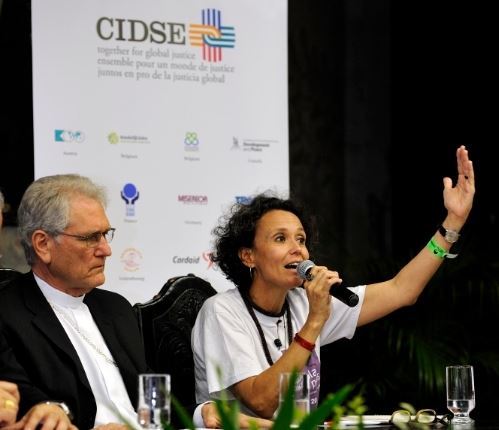
In 1992 a 13 year old girl asked world leaders attending the Rio de Janeiro Earth Summit to stop breaking the planet, if they weren’t able to fix it. Twenty years later leaders gather again in Rio to discuss measures to make our world more sustainable, but sadly there has been too much breaking and too little fixing in the meantime.
We have seen shy attempts by politicians to mend things, to address global challenges like poverty and climate change together. But our carbon-driven global economy has marched on in the meantime, increasing material well-being for some, but also fuelling economical, environmental and social inequalities. Climate change, which poses huge challenges to some of the world’s poorest communities experiencing increasingly extreme weather, is an obvious example. The exploitation of natural resources, which leaves the people of some of the world’s most resource-rich countries dirt poor, is another one.
Our delegation of church and civil society leaders to Rio+20 has a clear message. We must make sure all human beings can live a life in dignity and in harmony with creation. This requires fundamental changes to our economic model with its veneration for growth and profit. Let us focus on the common good instead with particular attention to the needs of the poorest and most vulnerable.
World leaders should plot a new path towards a sustainable, just and humane society. This involves a lot more than the cliché images of solar panels, windmills and energy efficiency tools, which were all over the place in the run-up to Rio+20.
Sustainable development is also about healthy business and finance, for example. Too often companies fail to respect the human rights of local communities in the areas in which they are operating, particularly in the extractive industries sector. The financial sector could do a lot more for the benefit of people and the planet too, for example by contributing to global development challenges through a small tax on financial transactions. Access to decent work and equal rights for women and men are also part of a more sustainable world.
Rio+20 should discuss real solutions, not only tweaks which will allow us to continue unsustainable consumption and production. We should move away from materialism and invest more in authentic human development and well-being in community. This also means we should also not only measure Gross Domestic Product (GDP) growth, but measure what matters; like reductions in poverty and inequality, quality of environment and social fabric, for example.
As Catholic development agencies we ask world leaders to fix things, but we are ready to do our bit too. In fact, Rio+20 is more than a catwalk for ministers and high-level officials. The ‘Cupula dos Povos’ (Peoples’ Summit) brings civil society organizations and social movements from all around the world together to discuss alternative solutions. Looking at the colourful coalitions of organizations ready to challenge each other’s thinking and come up with bold solutions is encouraging. Negotiating countries should feel encouraged to follow the good example and put common interest before national ones.
The world is watching Rio+20 this week, but in Rio most observers are skeptical about an ambitious outcome. Multilateral negotiations are a word by word battle and developed and developing countries don’t see eye to eye on some crucial issues on the agenda. For example, developing countries which have just started to enjoy economic development are reluctant to support measures which would hamper their growth rates and look at the world’s major emitters to lead efforts. They all should make our common future the main priority, but while all should do their bit it is the strongest shoulders which should bear the heaviest burden.
Rio+20 starts with high hopes and low expectations, which hopefully will be exceeded.
By Roeland Scholtalbers, CIDSE Media and Communication Officer, from Rio de Janeiro
More about CIDSE at Rio+20? www.cidse.org/rioplus20
